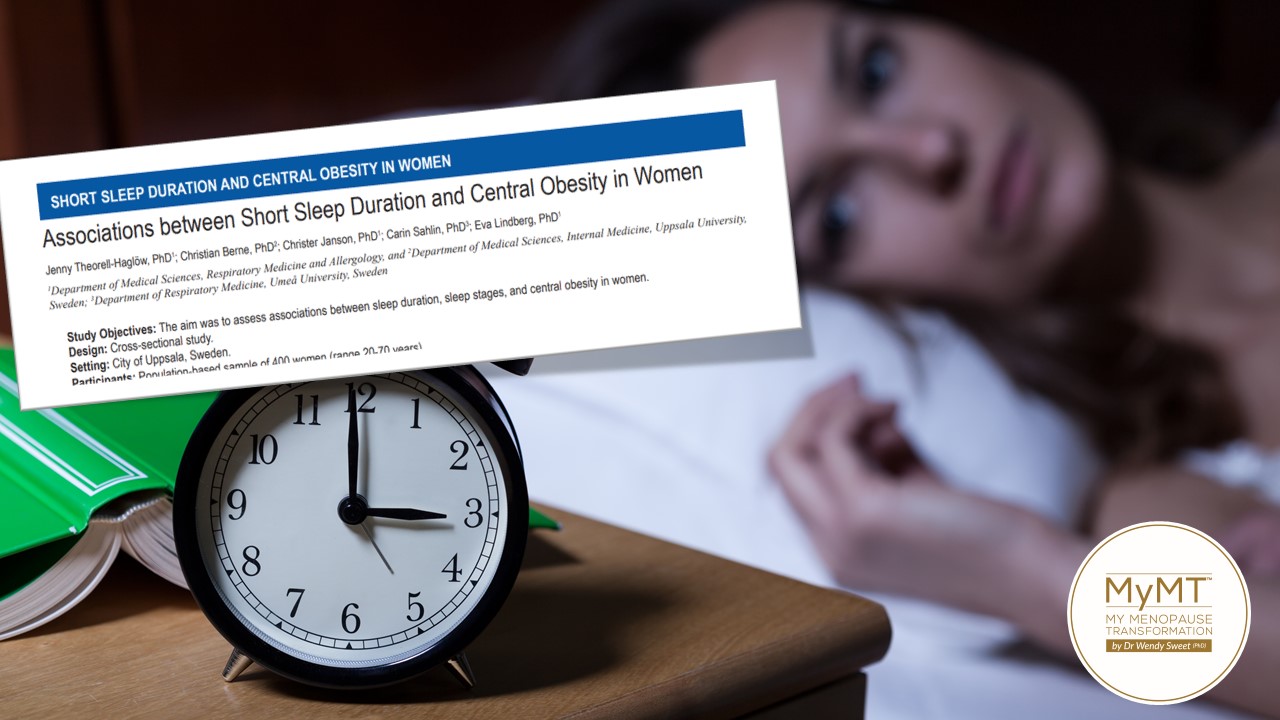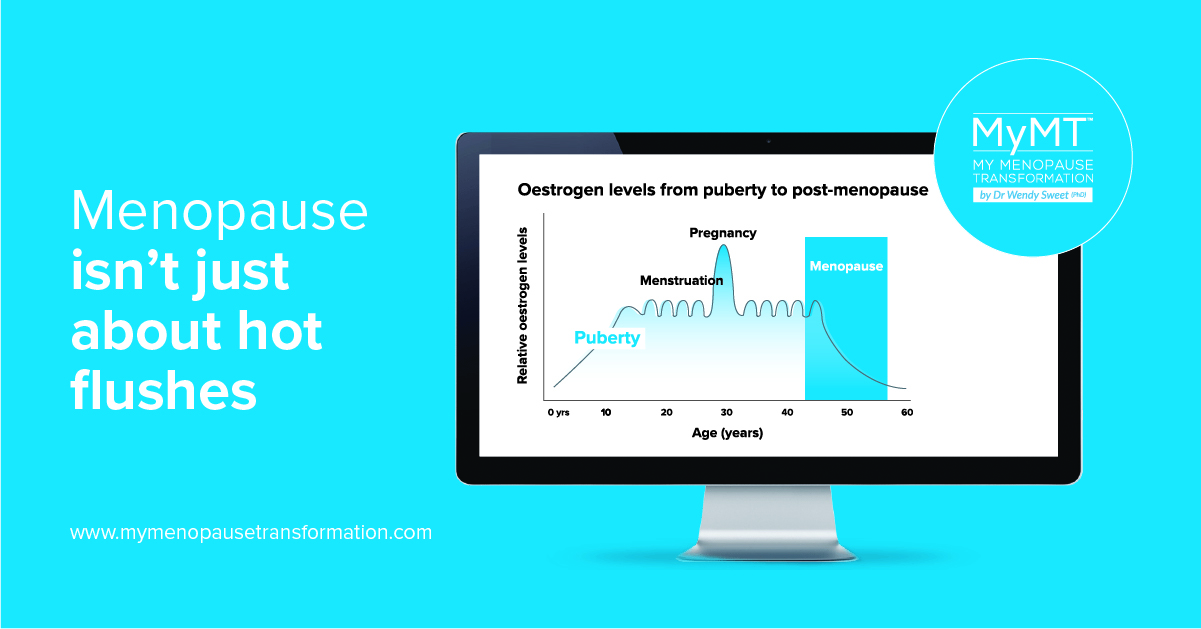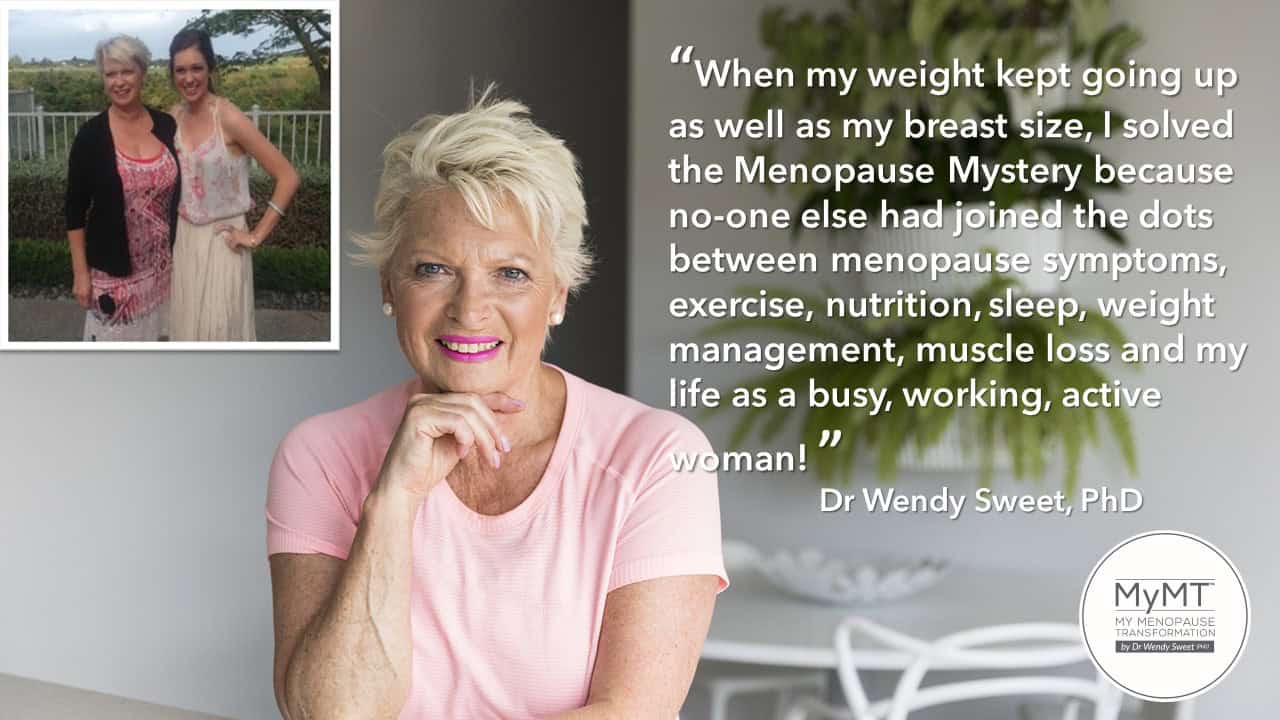The conversations in my private coaching group are amazing. Women from around the world learning that, for years, our menopause symptoms have been looked at in isolation, rather than from a ‘total body’ approach. “This makes so much sense” is the typical astonishing cry that I read in the group.
I totally understand how they feel. When my doctoral studies sent me down this path of understanding myself, I began to realise that when it came to lifestyle solutions for us during our menopause transition, nobody was placing these in the context of women’s ageing studies, nor were they ‘connecting the dots’ between menopause insomnia, weight gain, sore joints, palpitations and our hot flushes!
During the time of my studies, I was 15 kg overweight. My breast size had expanded considerably that I could almost balance a cup of tea on them, as my grandmother used to do! You can see what I mean in the inset image above. I was on Menopause HRT, exercising daily, trying to eat well, but despite the medications and supplements, there were three things which eluded me.
- A good night’s sleep and
- Joints and muscles that no longer ached
- An ability to put a stop to the weight gain.
I had no idea that these symptoms were linked to the menopause transition as well as insomnia, muscle loss, fatty liver and excess oestrogen storage in fat cells. Nor did I understand that BODY TYPE matters when it comes to our symptoms.
Over the past few weeks, I’ve noticed that numerous books, opinion articles and television documentaries have appeared about menopause. There have been a few here in New Zealand too. This is a great relief to me, as menopause is finally being bought into the limelight, However, I can’t help but reflect that as I watch, read or listen, what I’ve noticed is that many of the so-called new ‘menopause authors’ are thinner and leaner.
They aren’t overweight. They don’t seem to have the central obesity that can arrive during our menopause transition. Most also don’t appear to have large, heavy breasts as I had. They look to me to be thinner and leaner. Furthermore, hardly ever is there a mention of sore joints, aching muscles, restless legs at night, palpitations, weight gain or having to get up night after night to pee! It’s intriguing.
We all know that women differ in body-type don’t we? Some are larger, some are smaller. It was the same when we all went through puberty. I still remember the envy I felt when my friends didn’t get larger breasts nor did they put on weight.
But here’s the thing, how we respond to our menopause transition is exactly the same as our experiences in puberty. Some women put on weight, some stay the same weight, or even lose weight. This often depends on their stress levels, as well as their sleep, liver and thyroid health.
Women differ in the response to menopause symptoms depending on body-type, stress levels, sleep and of course, our past lifestyle matters to how well we transition through menopause too.
Many of you with excess body fat may respond to menopause HRT positively and lose weight and there is a body of research that suggests that this is one area of weight management to explore for women transition menopause. (Fenton, 2021).
But perhaps the most important issue in terms of managing weight gain during menopause, is to sort out sleep, which many of us already know, is adversely affected by hormonal changes during menopause. Sleep may be interrupted by night sweats and having to get up in the night to pee or for many women who do put on a lot of weight, obstructive sleep apnea can be the cause of waking up as well.
Then of course, when we feel tired, we don’t do as much and often turn to the wrong types of food and beverages. Sleep deprivation is also associated with lower levels of physical activity. Hence, studies tend to show an association between low levels of sleep and greater weight gain during the menopause and post-menopause years. [Davis et al, 2012].

When I learnt that body-type matters to our menopause symptoms, I decided to do something about it. I developed TWO DIFFERENT PROGRAMMES – CIRCUIT BREAKER for thinner/ leaner women and TRANSFORM ME for women, like me, who find that the weight is piling on, especially the body fat.
BOTH start with a module called Sleep All Night. Because without a good night’s sleep, then our symptoms don’t go away. You can read about these programmes HERE, both of which are on sale throughout April, 2022.
Everything I have put into the programme fits with the research I have completed on women’s healthy ageing. What I realised (for myself as well), is that if we don’t transition menopause well, then our health as we age changes too.
I also began to understand that because menopause is the ‘bookend to puberty’, as we enter this stage of life, we need to change our lifestyle habits to match our changing hormonal environment as we age. What we need are specific wellness strategies that match our hormonal changes and our body-type as we come through this stage of life.

That’s what you learn in the powerful My Menopause Transformation programmes.
My April, Sleep All Night special is ending soon. Please don’t miss out. Enter the PROMO code MYMTSLEEP to obtain your discount.
Get access today before the price returns to normal. AT NZ$199* this is only NZ$72 per month for three months (usually NZ$100).
If you are going to join me, then please click on the video below, as I would love you to get to know me.
Best wishes,
Wendy
References:
Davis SR, Castelo‑Branco C, Chedraui P, Lumsden MA, Nappi RE, Shah D, et al. (2012). Understanding weight gain at menopause. Climacteric 15:419-29.
El Khoudary SR, Shields KJ, Janssen I, Hanley C, Budoff MJ, Barinas-Mitchell E, Everson-Rose SA, Powell LH, Matthews KA. (2015). Cardiovascular Fat, Menopause, and Sex Hormones in Women: The SWAN Cardiovascular Fat Ancillary Study. J Clin Endocrinol Metab. 2015 Sep;100(9):3304-12.
Fenton A. (2021). Weight, Shape, and Body Composition Changes at Menopause. Journal of mid-life health, 12(3), 187–192.


